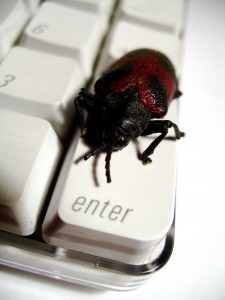Posted by Eric O. Schueler, Senior V.P. of Information Technology
Malware comes from the words “malicious” and “software,” and that is exactly what it is: malicious software that gets onto your computer without your consent. In the past, the term “virus” was more widely used, but gradually with society’s growing use and knowledge of computers, we have veered toward the more correct term of “Malware.”
Types of Malware and what an attacker uses it for
Malware covers a wide range of destructive software from viruses, worms, and keyloggers to spyware, adware, and ransonware. Let’s breakdown these terms so you can better understand what they are and what they can do:
- A virus is a piece of computer code that copies itself over and over. It generally destroys data or corrupts the computer system itself.
- A worm is a type of virus that does not attack computer files but instead, like a real worm, tunnels its way through your computer’s memory and hard drive storage space. Worms can slow down a computer system and make it take a long time to retrieve any files.
- Keyloggers, when used maliciously, can steal credit card information or passwords to your online accounts by recording the keys struck on your computer.
- Spyware is a type of Malware designed to steal information. It transmits data regarding your computer activities. It can control certain aspects of your computer without your consent or knowledge.
- Adware is a kind of forced advertising. Ads download or appear when you don’t want them too. A form of adware is pornware which pops up ads for paid porn websites.
- Ransomware is Malware specifically aimed at an individual. It prevents access to your computer system until a sum of money is paid.
Who creates Malware?
You are probably wondering who would possibly want to create malware and the answer is simple. They are criminals and more specifically, swindlers, computer vandals and blackmailers. Malware is a form of cybercrime or crime conducted over the internet. Malware developers can be skilled students trying to show off their newfound computer skills or professional developers; However nowadays even novices can create viruses due to the assistance of how-to websites.
Ways to prevent Malware from compromising your computer
Malware can range from annoying to devastating. It can infect your computer, and if your computer is on a network it can also be passed between computers. There are ways to protect your computer from Malware:
- Don’t open email attachments from unknown sources.
- Stay away from suspicious websites.
- Avoid downloading software or performing “computer scans” from pop ups.
- When installing software on your computer pay close attention to the messages in the boxes before clicking “ok.” Some software downloads include Malware, and you can avoid downloading “extras” by simply paying attention.
- Have the latest, up-to-date antivirus software and install all updates.
If you want your system checked, cleaned and anti-virus installed, you can count on HRCT to help protect your systems and data. Call today for information and to talk to our IT and Computer department. Ask for Eric O. Schueler, Senior V.P. of Information Technology at HRCT.
Call today! (757) 399-3350
Sources: pctools.com; usa.kaspersky.com; techterms.com; pcworld.com
Posted by Eric O. Schueler, A+, MCP, MCSE, MCTS, CSSA, ACSP – Senior V.P. of Information Technology at HRCT. Eric has been in the business of providing IT and consulting for small and medium business for more than 15 years.
Hampton Roads Communication Technologies (HRCT) provides quality business telecommunications solutions, like Virus Protection and Removal to companies and organizations throughout the United States, Mid-Atlantic and the Hampton Roads Virginia cities of Virginia Beach, Chesapeake, Norfolk, Portsmouth, Suffolk, Newport News and Hampton, north into Williamsburg and south into the Outer Banks of North Carolina. HRCT keeps your company connected with 24/7 emergency service.

